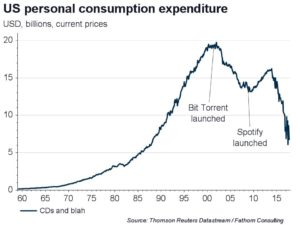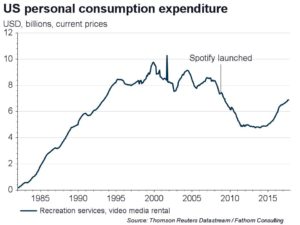
Article by Brian Davidson
A sideways look at economics
Productivity growth has been dire in many advanced economies over the last decade. And there’s plenty of disagreement among economists about why this has happened. To us, ultra-loose monetary policy is the problem. To others, measurement issues brought about by technological change, are to blame. In this Thank Fathom it‘s Friday we look at some of these measurement issues and discuss how Taylor Swift is doing her best to solve them.
Proponents of the ‘it’s a measurement issue’ theory point out how official economic data fail to reflect the advances in computer technology. In some cases, they may have a point. Think about maps, a thriving industry until Google decided to photograph the entire planet and provide it to people for free. Everyone in the world can now get free maps and satellite navigation as long as they have a smartphone and access to the internet. In this example, the consumer wins (by getting free maps), but map sales fall, meaning that all else equal (an assumption that we will return to shortly) GDP falls too. The result in this map-related, all-else-equal vacuum is the following: spending down; GDP down; and productivity growth down, too. Right. Right. And wrong.
Well, possibly, but probably not. If spending on maps goes down, it’s safe to assume that map employment fell too, meaning that both the numerator and the denominator used in the productivity calculation will have fallen. The net result on productivity will be unclear.(By the way, when economists talk about productivity we nearly always mean labour productivity, expressed as output per worker or output per hour worked.) In reality, of course, not all else is equal, and the money not spent on maps can be spent on other things, creating fresh demand and employment opportunities in other industries. In fact, such creative destruction ought to raise official productivity more often than not. This process is nothing new. It didn’t begin with maps and it won’t end with maps.
But to give the ‘it’s a measurement issue’ crew some credit, digitisation is affecting not just the map industry, but many other industries too. None more so than the music industry, where CD sales have plummeted – initially, thanks to illegal sharing and downloading of files made possible by digital technology and more recently, due to the emergence of online music streaming services such as Spotify. As the chart below illustrates, US nominal spending on ‘prerecorded and blank audio discs/tapes/digital files/downloads’ (henceforth referred to as CDs and blah) has fallen by more than half since 2001 – more than $10 billion per year. In real terms the decline has been a little smaller, since the CDs and blah deflator has also fallen over the period. The shortfall works out to be around 0.1% of annual US GDP, which isn’t that large, but it isn’t insignificant either, especially if other industries have also been disrupted by technology in similar ways.

But while CD sales have fallen, subscriptions to music streaming services have risen. People generally need to pay for these, although free versions, which are interrupted by adverts every now and then are also available. Almost 90% of employees at Fathom pay for music streaming services such as Spotify, which generally cost around £10 per month. In return, they offer access to an almost endless library of music, that can be played at any time. An annual subscription equates to roughly the same price as ten music CDs. It’s not clear whether the average person would normally buy this many CDs a year, or whether a music streaming service is a perfect substitute, but the variety of music offered by such services puts even the most impressive record collections to shame. 43% of employees at Fathom said that they spent more on streaming services such as Netflix and Spotify than they used to spend on DVDs and CDs; 57% said that they spent less on such services, suggesting that the net spend on music (CDs and streaming services) has fallen. All of the Fathom employees that used these services said that they got more value for money by using these services than they did before by buying CDs or DVDs. Consumer benefit up. Net spend down. Remember maps?
The Bureau of Economic Analysis classifies music streaming services within the PCE for video media rental services. Sales in this category are actually lower today than when Spotify was launched in October 2008; sales of music streaming services rose over this period, but this was more than offset by a decline in sales of other services within this category. Either way, the more than $10 billion decline in annual sales of music CDs (or technically speaking CDs and blah) since 2001 is more than the entire annual volume of sales of ‘video media rental services’. The bottom line is that the net spend on music (CDs and music streaming) has fallen.

Taylor Swift is fighting back. The American popstar, who provides most of her music to Spotify has angered music streaming executives by not making her latest album, Reputation, available on such services. People who want to listen to her album will have to pay to download it or purchase the CD. She released the album last month and it sold 1.212 million copies in the first week alone. At $15 a pop, that’s worth $18 million in sales – in one week. Keep that up for the year and that’s another $945 million in sales of CDs and blah. Assuming nobody cancels their Spotify subscription because the latest Taylor Swift album isn’t available, her actions could boost US GDP by nearly $1 billion over the course of a year, adding 0.005% to annual GDP. Assuming employment is unaffected by her actions, aggregate US productivity growth would rise 0.005%. Not bad for one person. Imagine what could happen if Bruno Mars and others followed her lead?
Sadly, these calculations may be a little too optimistic since they rest on the assumption that she could keep up such a pace of album sales for a whole year, and that people whobuy Taylor Swift albums don’t reduce their spending on other items. Once again, the net effect on aggregate spending and employment is somewhat unclear. Sadly, we can’tconfidently conclude that Taylor Swift is the answer to the US productivity problem.
There may be other intangible benefits of owning a Taylor Swift album, such as the feelgood factor from having a CD with a picture of Taylor Swift on the cover, or listening to one of her songs. (No one at Fathom admitted to owning the latest Taylor Swift CD – one Fathom employee got visibly annoyed when I asked.) But these benefits are essentially non-market and cannot be expected to be captured by official output, or productivity, data. There could be issues related to hedonic adjustment of digital services such as music streaming – that is, adjustment in price indices to reflect improving quality – but such a discussion is beyond the scope of a Friday afternoon blogpost. We’ll be publishing more research on the impact that technological change has on the economy in due course.

